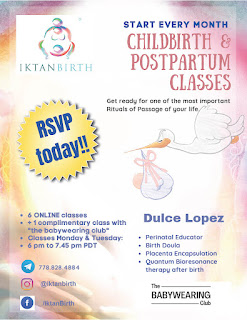Cambio #2: Cuéntales una historia mágica de su nacimiento
Texto de Pam England
publicado originalmente en http://birthpeeps.blogspot.com/2010/09/change-1-part-2-how-we-tell-birth.html
Traducido por Dulce Lopez
Mientras piensas sobre tu primera historia (s) de nacimiento, continuaré con algunos otros pensamientos acerca de cómo el cambio empieza con nuestros niños.
Mi madre me contó muchas versiones de su propio y nuestro nacimiento. Disfruté las "mágicas" historias sobre el día en que nacimos. Para mi hermana menor, Laura, mi mama decía, “tú trajiste la primera nevada… Naciste en la noche y cuando el sol salio, había una sábana de nieve sobre la tierra.” Aún pienso en esa historia y cada año que empieza a nevar recuerdo, “mi hermana trajo la primera nevada.
Cuando un niño escucha una historia que transmite que eldia en que nació fue el peor, el más doloroso día de la vida de su madre, que ese nacimiento lastimó a su madre hasta “casi matarla”, o detalles de intervenciones innecesarias que tuvo que pasar… que imaginas que ese niño pueda sentir?
Los niños pequeños tienen una mente mágica, lo que significa que ellos piensan que ellos causan que las cosas sucedan, que algo que ellos hicieron causó que sus padres pelearan o gritaran, o se divorciaran, o que sufrieran durante el parto. Ellos cargan con esa culpa y pena, y desde su inocencia, creencias erróneas crean una constelación de historias acerca de su mundo, de sus relaciones, de quien son, y de cómo es el nacimiento.
No importa lo que pasó en el parto, un niño quiere saber acerca de su nacimiento y que su llegada fue muy especial. Entonces, encuentra algo que haya sido especial acerca del dia en que tu niño nació, algo que recuerdes, algo divertido que haya ocurrido, o algo que hizo el niño que fue entrañable, gracioso o lindo.
Una historia mágica esta hecha para los niños. No es una historia médica, de hechos, tampoco es fantasía, o una "mentira". Se trata de una versión única de la historia que se centra en algo especial sobre el día en que el niño nació: es una historia que un niño pequeño pueda y quiera escuchar. Y mientras el niño crece y se convierte en adulto, habrá mucho tiempo para historias de nacimiento para adultos, cuando tengan suficiente experiencia de vida para entender una versión mas compleja.
Algunos padres cuentan esta Mágica historia de nacimiento el día de su cumpleaños; es un tipo de ritual de celebración de cumpleaños. A mis hijos les encanta su historia. Cada año, es contada de una manera diferente. Cada año el niño la escucha diferente. Quizá en cada año que cumple, un poco más de detalles se van añadiendo a la versión. Mi hijo de 19 años sonrió cuando escuchó su historia este año, y escuchó algo que nunca había escuchado antes. Sigue siendo su Mágica historia de nacimiento.
My mother told us several versions of her, our, birth stories. I relished the "magical" stories about the day we were born. For my younger sister, Laura, my mother would say, "You brought the first snow... You were born in the night and when the sun came up, there was a white blanket of snow on the earth." I still think of that story and image every year on the first snow, "my sister brought the first snow."
When a child hears a story that conveys that the day they were born was the worst, most painful day of their mother's life, that their birth hurt their mother, "almost killed her," or details of unwished-for interventions that she had to suffer--what do you think the child feels?
Young children are in "magical" thinking which means they think "they" cause things to happen, that something they did causes their parents to fight, cry, get divorced, or suffer in labor. They carry this guilt and grief, and from their innocent, misguided beliefs they create a constellation of stories about their world, relationships, who they are, and about birth.
No matter what happened in labor, a child wants to know about "their" birth and that their arrival was special. So, find something that was special about the day your child was born, something you thought about, something funny that happened, or something the child did that was endearing, funny, or cute.
Imagine telling a child their birth story as a child's version, a sweet, Magical Story of the day they were born.
A Magical Story is meant for the Child. It is not a medical, factual story, it's not fantasy, and it's not a "lie." It is a unique version of the story that focuses on something special about that child's birth-day: it is a story a small child can hear and wants to hear. As the child grows up and becomes an adult, there will be plenty of time for adult stories about birth--when they have enough life experience to understand a more complex story.
Some parents tell the Magical Birth Story on the child's birth day, a kind of birth day celebration ritual. My boys love their birth-day story. Each year, it is told a little differently. Each year the child hears it differently. Maybe as they grow up, a few more details will be added. My 19-year-old son smiled when he heard his birth story this year, and he heard something he's never "heard" before. It is still his Magical birth story.



Comments